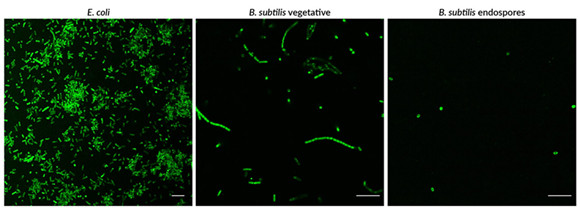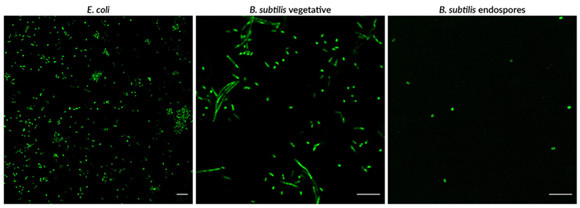
|
BactoSpore™ Bacterial Stains
| Origin of place |
United States  |
| Model |
|
| Supplier |
Biotium, Inc. |
| Price |
|
| Hits |
622 |
| Updated |
3/25/2024 |
|
Fluorescent dyes optimized for staining endospores. The dyes also stain both live and dead bacteria of gram-positive and gram-negative strains. In B. subtilis, the dyes stain both vegetative cells and endospores and have been validated for detection by fluorescence microscopy and flow cytometry.
PRODUCT DESCRIPTION
BactoSpore™ Stains are fluorescent dyes optimized for staining endospores. The dyes also stain both live and dead bacteria of gram-positive and gram-negative strains. In B. subtilis, the dyes stain both vegetative cells and endospores and have been validated for detection by fluorescence microscopy and flow cytometry.
. Optimized for staining endospores, unlike other bacterial detection reagents
. Validated for microscopy or flow cytometry
. BactoSpore™ 485/500 for membrane staining in the FITC channel
. BactoSpore™ 488/540 for nucleic acid staining in the FITC or PE channel
Novel bacterial stains designed for bright staining of endospores
Bacterial endospores are tough dormant structures formed by certain strains of bacteria including Bacillus and Clostridium species in response to nutrient deprivation and other stressors. Endospore formation allows these bacteria to survive in a non-replicative state until growth conditions improve, at which point the spores can germinate to allow vegetative cell replication. Endospores provide a reservoir of potentially infectious bacteria that are resistant to disinfectants, heat, and other decontamination treatments. In addition, the spore coat is highly impermeant and resistant to staining with bacterial detection reagents, making it difficult to study endospore formation and inactivation.
BactoSpore™ stains were developed to tackle the challenge of endospore detection by offering bright staining of endospores as well as live and dead bacteria. BactoSpore™ 485/500 Membrane Stain is a green fluorescent lipophilic membrane dye for the FITC channel. BactoSpore™ 488/540 Nucleic Acid Stain is a yellow fluorescent nucleic acid dye that is detectable in both the FITC channel and the PE channel for flow cytometry.
BactoSpore™ Bacterial Stains
BactoSpore™ 485/500 Membrane Stain
BactoSpore™ 485/500 Membrane Stain labels gram-negative bacteria, gram-positive bacteria, and endospores. E. coli or B. subtilis vegetative cultures were grown in tryptic soy broth (TSB) overnight. B. subtilis were induced to form endospores by growing cultures in Difco sporulation medium (DSM) for 7 days. Cultures were washed in PBS and stained with 1X BactoSpore™ 485/500 Membrane Stain in PBS for 30 minutes at room temperature, then imaged by confocal microscopy in the FITC channel. Scale bars: 10 um.
BactoSpore™ 488/540 Nucleic Acid Stain
BactoSpore™ 488/540 Nucleic Acid Stain labels gram-negative bacteria, gram-positive bacteria, and endospores. E. coli or B. subtilis vegetative cultures were grown in tryptic soy broth (TSB) overnight. B. subtilis were induced to form endospores by growing cultures in Difco sporulation medium (DSM) for 7 days. Cultures were washed in PBS and stained with 1X BactoSpore™ 488/540 Nucleic Acid Stain in PBS for 30 minutes at room temperature, then imaged by confocal microscopy in the FITC channel. Scale bars: 10 um.
View Biotium’s full selection of microbiology stains, including BactoView™ Live and BactoView™ Dead stains for staining live and dead bacteria, respectively. Biotium also offers BactoView™ Viability Kits, which include a choice of red or far-red BactoView™ Dead Stain for dead bacteria and BactoView™ Viability Green Counterstain to stain all bacteria. BactoView™ Dead Stains also can be combined with fluorescent Gram stains like our CF® Dye WGA Conjugates.bio-equip.cn
Biotium, is a leading life science reagent manufacturer and supplier devoted to providing high-quality and innovative fluorescent tools that fuel scientific discovery. Our collaborative team of experienced chemists and biologists, who are at the forefront of fluorescent dye design, apply chemistry-based principles toward producing solutions for unmet challenges in life science and medical research. Since its founding in 2001, Biotium has developed over 30 patented technologies that have been licensed out to leading life science technology companies worldwide. For more information, please visit www.biotium.com.
|
|
|



